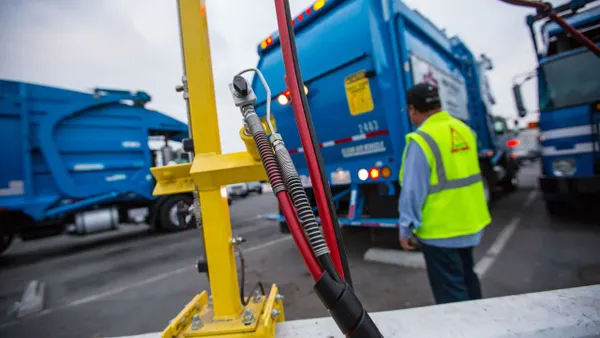Dive Brief:
-
An analysis by the Center for Biological Diversity and the "Ugly" Fruit and Veg Campaign gave none of the 10 biggest U.S. food retailers an "A" on reducing the overall food waste problem, tracking and publicly reporting waste, and diverting what they can from the waste stream by selling imperfect produce.
-
After assessing the 10 big grocery firms based on those criteria, the center gave its highest grade of "B" to Walmart. Ahold Delhaize U.S., Kroger and Albertsons all got a C; Target, Trader Joe's, Whole Foods Market, Costco and Publix all earned Ds; and Aldi received the lone F.
-
The report concluded customers are increasingly aware of the food waste problem — an estimated 40% of the food produced in the U.S. every year is wasted — and they want responsible grocery companies to do their part to fix it.
Dive Insight:
Although some retailers have been getting more active in trying to limit their food waste — Kroger has been campaigning about the issue, while Whole Foods has trialed the sale of "ugly" fruit — the fact that no supermarket chain in the study's top 10 got a top mark isn't very reassuring.
Even those that did well are typically more focused on donating and recycling unwanted food items rather than preventing them in the first place, the study pointed out. Walmart received a B because it scored well on prevention strategies. And, while Ahold Delhaize got high marks for accountability, it didn't do very well in prevention or recovery and recycling, the study noted.
Jordan Figueiredo of the "Ugly" Fruit and Veg Campaign told National Public Radio that Walmart has been standardizing its expiration labels so that "Use By" goes on perishable items and "Best if Used By" is put on those with a longer shelf life. In addition, he said the retail giant has taken to replacing a cracked egg in an egg carton so the entire package doesn't need to be tossed — a move that has saved millions of eggs.
At the retail level, reducing waste in produce departments is often cited as a major problem grocers face. Reasons often relate to overstocking and poor ordering and forecasting procedures. Because shoppers prefer to see perfect items perfectly displayed, some retailers tend to toss out anything that doesn't fit that ideal image. However, tackling food waste was recently called an $18.2 billion opportunity for retailers in a report from ReFED.
The American Farm Bureau Federation recently launched a campaign to bring further consumer awareness to food waste as an issue. This specific campaign wants to highlight how some farmers, in daily practice, work to reduce wasted food.
While mandated organics recycling is having mixed success around the country, a new report shows the U.S. could generate $7 billion in revenue and create more than 160,000 jobs by implementing a nationwide policy to divert 50% of organic material. Costs for new operations, like anaerobic digesters, may be high, but there is substantial commercial opportunity.










